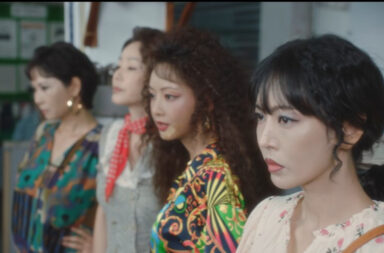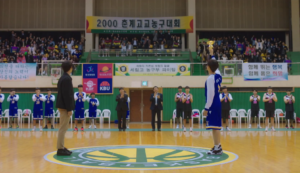
It’s a phenomenon that has popped up time and again in popular media: the protagonist, by some magical twist of fate, regresses to an earlier age, thus gaining the opportunity to change a clearly unhappy fate. In recent years, we’ve seen it in dramas like Mr. Baek, whose spiteful protagonist is given a second chance at love, and Familar Wife, which has its lead go back in time in order to avoid a doomed marriage. Perhaps most memorably, this plot also appears in the 2014 film Miss Granny, which places its focus on the oft-forgotten grandmother and gives her another shot at the dream she was deprived of.
Its popularity speaks to the enduring effects of regret and our own yearnings for youth and second chances, but it also brings about a storytelling challenge: when employing this trope, how do you make it different this time around?
While the mentioned stories have surely put their own spin to it, 18 Again, a remake of the 2009 film 17 Again, chooses to go beyond a singular struggle and instead dives deep into an entire family’s fraying relationship with each other. By placing more characters — and consequently more stories — in the spotlight, the latest series by Ha Byung-hoon (who also directed the similarly premised Confession Couple) takes advantage of its roomy TV format and provides just enough depth, flair, and heart to a familiar and otherwise conventional plot.
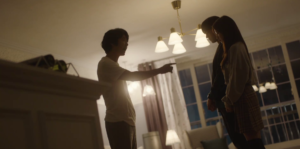
18 Again is the story of how Hong Dae-young (Yoon Sang-hyun), a disgruntled middle-aged man on the brink of losing everything he has, turns into his teenage self one fateful night and ventures to give his life a do-over. He tries his hand again at basketball, a dream that abruptly ended when he got girlfriend Ja Da-jung (Kim Ha-neul) pregnant with twins during their senior year in high school. Believing that choosing his kids over college is what lead him to a life of misfortune, Dae-young uses his newfound youth to establish a fresh start.
He poses as Go Woo-young (Lee Do-hyun) and enrolls in the same high school his children Shi-ah (No Jeong-ee) and Shi-woo (Ryeoun) go to. Though initially there to clinch a basketball scholarship, his priorities change as soon as he learns about the problems the twins have been hiding from him. As their new friend Woo-young, Dae-young makes it his mission to guide and protect them as best he can, something he wasn’t able to do as an overworked father.
Now, stories in this vein will typically stop here, focusing mainly on Dae-young’s journey to becoming a better husband and father. He is, after all, the subject of the transformation. As the title suggests, this should be all about him and the lessons he learns as he turns 18 again.
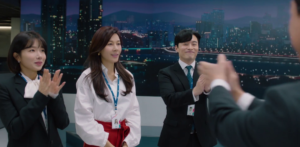
But crucially, the series is as much about Da-jung, Shi-ah, and Shi-woo as it is about Dae-young. In fact, much of the show’s runtime is dedicated to Da-jung’s blossoming career as a TV announcer, to Shi-ah’s growing rebellion, and to Shi-woo’s self-esteem issues. Their experiences, both individually and together, often intercut one another, resulting in a rich and interwoven tale about family.
We learn, for example, that one factor in Da-jung’s late pursuit of her broadcast dream is because Dae-young has made her feel that she shouldn’t want more than her family. Later in the series, he reflects, “I used my busy, hectic life as an excuse and turned her into someone who had no other life besides being a wife and mother.”
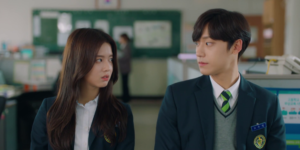
Likewise, Shi-ah’s rush to become independent by working a part-time job and Shi-woo’s reluctance in joining the school basketball team both stem from a belief that their unplanned conception is the root cause of their parents’ unhappiness. “I know that I’m a burden,” Shi-ah says after Da-jung tells her to quit her job. “That’s why I’m trying my best not to be one anymore.” Meanwhile, Shi-woo unknowingly confesses to Woo-young, “My dad quit playing basketball after I was born. That’s why I wanted to achieve his dream for him. But I was afraid he’d be disappointed if I was bad, so I pretended not to care about it.” As much as Dae-young and Da-jung’s actions have affected their children, so have Shi-ah and Shi-woo’s resulting conduct affected the couple.
Of course, as each of them evolves during the show’s run, the impacts start to be more positive. For one, Da-jung’s courage as an announcer inspires Shi-woo to finally take the plunge and try out for the school basketball team. And as Dae-young softens up his parenting ways and relays his support through Woo-young, the children become more confident in themselves, with both Shi-ah and Shi-woo eventually going after their dreams.
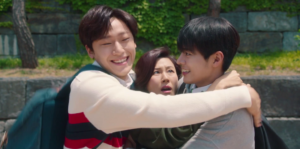
Till the very end, we’re reminded of how much of a family, as opposed to an individual, story this is. When Dae-young, in an enlightened and mature attempt to finally take proper care of his family, decides to let go of an imminent scholarship and get his real body back, Da-jung steps in and tries to stop him — not to protect the twins from shock or to save her public image from ruin (already in deep water, dating a “younger” boy will further drown her career to death), but to selflessly give Dae-young what she thinks he truly wants, that is, a life of his own. “You should live your own life,” she tells him, “You’re a good person. You more than deserve it.”
By making the entire family learn and transform alongside Dae-young, and by showing us how each relationship informs one another, the series seems to suggest that growth is neither singular nor linear. Instead, it’s extensive and erratic, showing up and affecting people randomly, but always profoundly. In this way, 18 Again makes the traditional age-reversal plot all the more meaningful and intriguing.
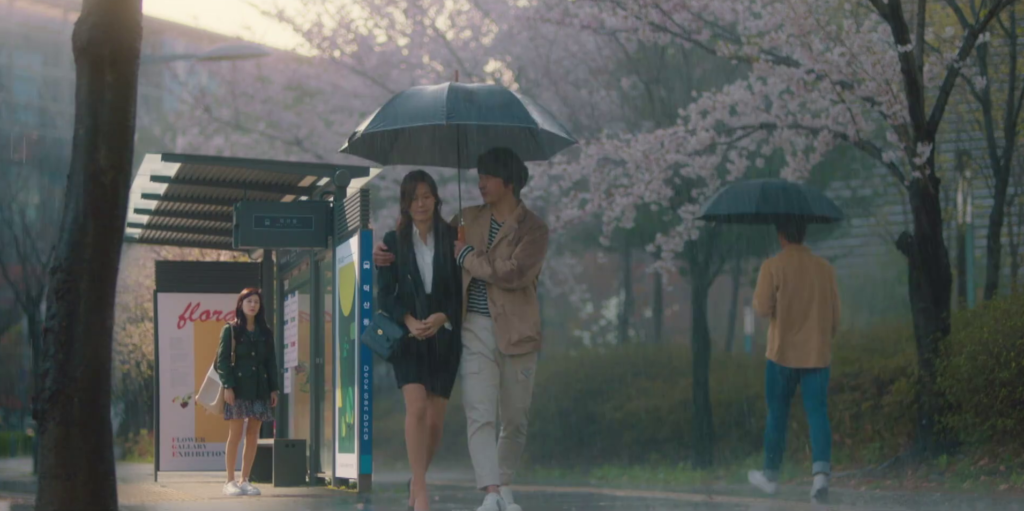
Another interesting way it enhances a familiar narrative is by adding more technical flair to it. Notably, the show doesn’t stick to one point in time — we’re constantly being thrown to 18 years ago when Dae-young and Dae-jung first met, to 10 years ago when the twins were still kids, and even to just months ago at the height of the couple’s falling-out. But instead of solely relying on different color schemes and title cards to indicate time and setting, the editors make good use of the transitions between each timeline. Each scene blends into the next slickly and seamlessly, as if to further drive home the point that the past is never left behind but carried in our present lives through and through.
When Da-jung, for example, recalls how Dae-young cheered her up after a failed audition, the memory doesn’t simply cut to the current time nor fade into another sequence as it ends. Instead, it lingers, enmeshed in Da-jung’s present time as she watches it unfold before her. Similarly, when Shi-ah reminds her childhood buddy of how he overcame his fear of heights with her, the memory doesn’t halt to a stop but extends to the present, with Shi-ah trailing right behind her younger self.
Not only does this effectively reinforce the show’s point about family and history interconnectedness, but technically, it’s also a creative and efficient way to mark the passage of time in a non-linear story. Because of the smooth and inventive way they are edited, flashbacks, despite their sheer volume here, never disturb the story’s flow.
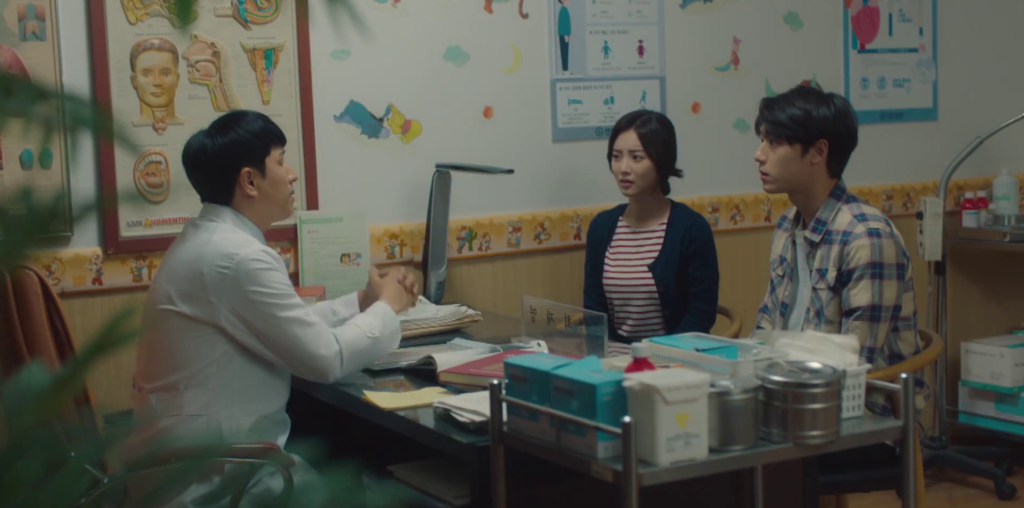
Aside from depth, another natural outcome of the show’s considerable focus on characters is its coverage of wide-ranging issues. Of course, among the most recurrent is Dae-young and Da-jung’s premarital union, the effects of which have followed them all their lives — their parents question their judgment and kick them out of the family, peers and employers refuse to acknowledge their skill and talent, forever branding them as “the kids who got knocked up in school,” even their children call them hypocrites when being scolded (Shi-ah’s impassioned “Don’t worry, I won’t be like you!” retort must’ve stung like no other). But rather than take a stance and moralize, the show presents varied and grounded views through the characters. Dae-young and Dae-jung themselves are split on the matter — while a part of Dae-young regrets leaving behind his career for family, Da-jung has always insisted that the children’s birth, unexpected as it was, was a “true blessing.”
For the most part, the show takes the same well-rounded approach in tackling other weighty topics, like when it depicts the ageism Da-jung experiences as she is constantly put down and replaced with younger, less-skilled reporters (as her news director puts it, “Anchors only last for five years — and yet that’s still too long for this old woman”) or when it dares to differentiate between bullying and standing up for oneself (Dae-young firmly tells his children, “Violence is bad, but there are times you shouldn’t hold it in…If you put up with it, the strong will become stronger and the weak, weaker”).
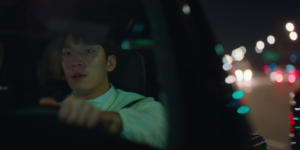
However, while ultimately a positive, its attempts to be comprehensive may be heavy-handed at times, like when it touches on premarital sex but never explains its nuances or when it jokes about adult-minor relationships but never comments further on it. Similarly, some characters, such as second-lead Ye Ji-hoon (Wi Ha-joon), are given tragic backstories that don’t seem to move the story in a significant (or any) direction at all.
When it introduces issues or plotlines it can’t sustain, the show risks weighing an already hefty story down. As Go Deok-jin (Kim Kang-hyun), Choi Ae-rin (Lee Mi-do), and their amusing, hijinks-laden subplot in the show prove, not everything has to be profound or devastating to justify its inclusion in the story— it can just be there to provide the breather and comic relief this kind of drama needs.
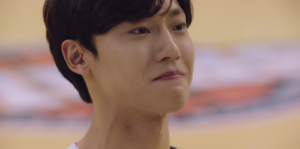
Lastly, its spacious format and studious characterization provide the show with a great deal of heart. Never mind the deep and elaborate storylines, the chemistry of these characters alone make it a highly watchable series. Though the entire ensemble is convincing in their respective portrayals, Lee Do-hyun is especially impressive as an ahjussi who constantly forgets he’s in an eighteen-year-old’s body. His random bouts of sermons are always hilarious and the hurt he feels as a regretful father and husband is deeply palpable. To simultaneously display youthful blitheness and middle-aged remorse is no easy task, but Lee Do-hyun rises up to the challenge with admirable ease.
18 Again doesn’t serve anything particularly new or revolutionary. As one has come to expect in K-dramas, amidst all the trials and tribulations, all ends well. Da-jung does get back together with Dae-young, Dae-young is finally accepted by his children, and the children gain a deeper understanding of what family is. Despite the brave turns it takes in theme and character, it hits more of the same beats its predecessors have. But unlike them, the series takes full advantage of its considerable runtime, elaborating in detail the things we take for granted in traditional, templated plots such as this. In the end, it doesn’t so much as break convention as it simply expounds on it. And that alone makes all the difference.
(Images via JTBC)


